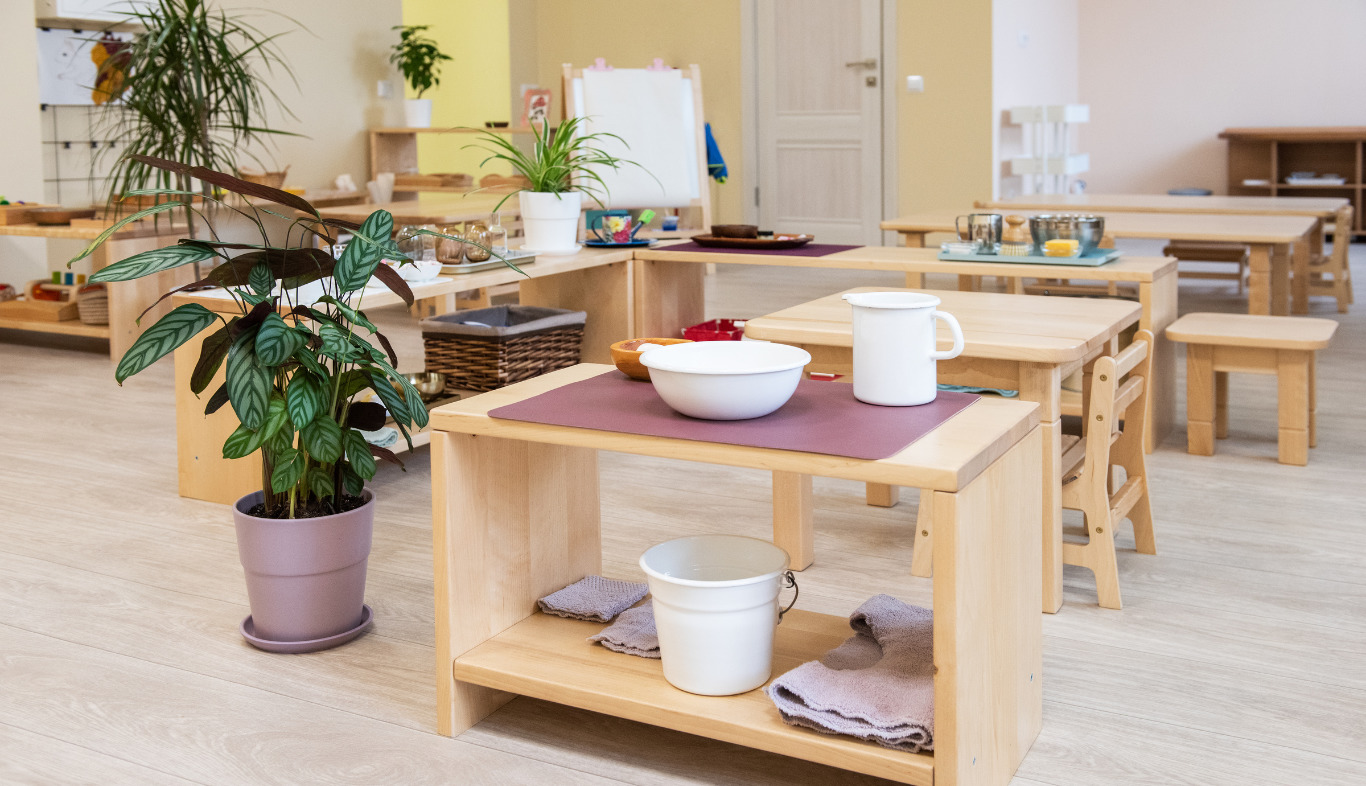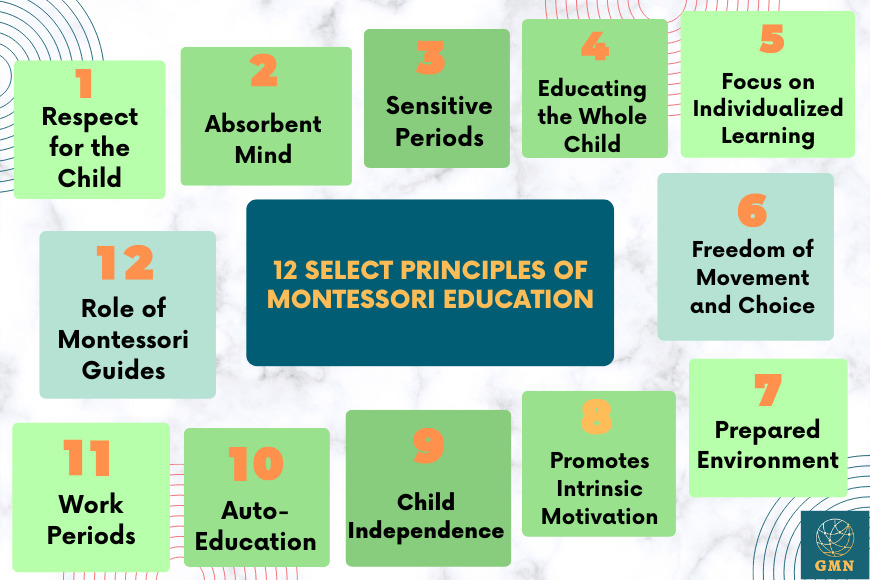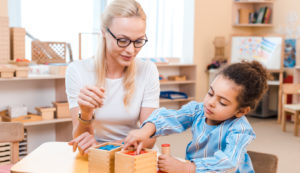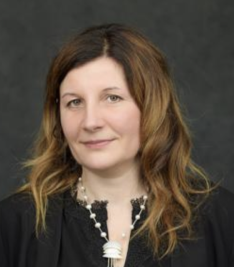The Montessori method of education was developed by Dr. Maria Montessori through an iterative process of experimentation and observation. The principles of her method are based on the idea that children can learn through self-directed exploration.
The Montessori method emphasizes the importance of a child’s social and emotional development, independence, creativity, and freedom within an educational environment. Let us learn about 12 select principles of Montessori education.
Principle #1: Respect for the Child
Dr. Maria Montessori believed that every child is unique. Some children work best with more freedom, some need to be told what to do, and some may not respond well to any form of control. Therefore, Montessori schools are rooted in a deep respect for the uniqueness of every child. Children have the freedom to choose, make mistakes, and learn at their own pace.
Principle #2: Children have an “Absorbent Mind”
Through years of observation and research, Dr. Maria Montessori determined that early age development (0 to 6 years) is crucial as a child learns by observation. She termed this stage of development as the “absorbent mind” because during this stage a child has a sponge-like capacity to absorb information from their environment.
“At some given moment, it happens that the child becomes deeply interested in a piece of work; we see it in the expression on his face, his intense concentration, the devotion to the exercise.” — Dr. Maria Montessori in The Discovery of the Child.
Children can use their own judgment and work in a self-directed manner, which is what allows them to grow into independent thinkers. Thus, it is important to develop a sense of their culture and lay the foundations of their learning, intelligence, and personality.
Principle #3: Sensitive Periods
Dr. Maria Montessori observed a child passes through a phase of development to learn specific skills and knowledge areas. She termed this phase as a sensitive period (a phase of development in which children are highly motivated to learn). Sensitive periods are characterized by intensity, repetition, and commitment.
Principle #4: Educating the Whole Child
‘Educating the Whole Child‘ refers to the process of educating all the child’s senses in order to build awareness and understanding.
The Montessori method of education therefore focuses on nurturing each child’s potential by providing a developmentally appropriate learning environment that supports their intellectual, physical, emotional, and social growth.
The school environment is designed with children in mind, so it has many different stimuli for them to learn from. The Montessori curriculum covers all aspects of development, such as practical life, sensorial, cultural, language, mathematics, geography, and science.
Principle #5: Focus on Individualized Learning
Montessori education places an emphasis on the idea that children are capable of handling their own learning. Therefore, the Montessori school places children with peers of varying ages, abilities, development needs, and levels of achievement in a common classroom.
“The fundamental help in development, especially with little children of 3 years of age, is not to interfere. Interference stops the activity and stops concentration.” — Dr. Maria Montessori in The Child, Society, and the World: Unpublished Speeches and Writings.
Children are encouraged to carry out activities based on their individual developmental needs, while educators keep track of their progress based on observation. Thus, making learning active, individualized, self-correcting, and tailored to the needs and interests of each individual child.
Principle #6: Freedom of Movement and Choice
The Montessori method of education is based on the belief that children are capable of self-learning and should be given the opportunity to develop their intellectual, physical, social, and emotional capacities through self-directed exploration.
In Montessori learning environments, children are free to move around at will and choose from a variety of activities, while educators act as facilitators in the background, providing guidance when necessary. The curriculum is planned in advance and is prepared so that children can learn best and discover learning outcomes through hands-on experience.
Principle #7: Prepared Environment
Maria Montessori observed that children learn better in an environment that is organized to support their learning and interests. This was termed a prepared environment.
“Children acquire knowledge through experience in the environment.” — Dr. Maria Montessori in The 1946 London Lectures.
In a prepared environment, children are free to follow their interests, choose their work, and progress at their own pace within this space.
Principle #8: Promotes Intrinsic Motivation
The Montessori classroom is prepared in such a way that promotes intrinsic motivation and self-regulation. Children are given the freedom to progress at their own pace, which creates a sense of autonomy by providing them with the opportunity to follow their interests.
Intrinsic motivation is the desire to learn within each child and themselves. It is an individual and individualistic type of motivation.
There are no gold stars or extrinsic rewards for children’s learning in a Montessori classroom. Completing an activity and learning how to do it themselves gives children a sense of accomplishment, an intrinsic reward.
Principle #9: Child Independence
The Montessori classroom promotes independence through a hands-on approach. Children are encouraged to work individually and in groups. It allows them to develop self-regulation and leadership skills.
“The child’s development follows a path of successive stages of independence, and our knowledge of this must guide us in our behavior towards him. We have to help the child to act, will, and think for himself. This is the art of serving the spirit, an art which can be practiced to perfection only when working among children.” – Dr. Maria Montessori in The Absorbent Mind.
Montessori classrooms are designed intending to carry out the three guiding principles of development: sensorial, intellectual, and moral development. It helps children to see, hear and touch everything of their interest in the room. The three-tier system of essential equipment (i.e., all materials necessary for a particular stage of learning) allows Montessori classrooms to be self-contained and prepared for any type of opportunity, while also using less space.
The Montessori curriculum is based on the idea that children are born with a natural curiosity and a love for learning. Each child’s interests should be respected and encouraged to explore independently.
Principle #10: Auto-Education
In the Montessori Method, auto-education is one of the foundational principles.
“A child who has become master of his acts through long and repeated exercises, and who has been encouraged by the pleasant and interesting activities in which he has been engaged, is a child filled with health and joy and remarkable for his calmness and discipline.” — Dr. Maria Montessori in The Discovery of the Child
This approach is based on the belief that children are capable and willing to learn if given the right learning opportunities and experiences. To meet the development needs of the children so that they can learn by exploration, Montessori classrooms, and materials were also developed. Montessori educators observe a child’s progress and provide them with a prepared environment, guidance, and encouragement to auto-educate themselves.
Principle #11: Work Periods
A work period is a time during which children are engaged in some form of activity. During their classroom lessons, Montessori schools emphasize uninterrupted work periods so that they can concentrate on a single subject. They do not have a set number of work periods each day, but have a set length for each work period. Depending on the age and learning ability of the child, the work period can last from 20 minutes to 3 hours. As a result, the children can concentrate on what they are learning and enjoy it more.
Principle #12: Role of Montessori Guides
Montessori teachers are known as guides or, more generally, as educators. Guides encourage Children to take responsibility for their own learning by providing an environment where they can explore, test, experiment, and make mistakes. Their role is to observe and guide children through self-directed, self-paced, and self-guided activities.










